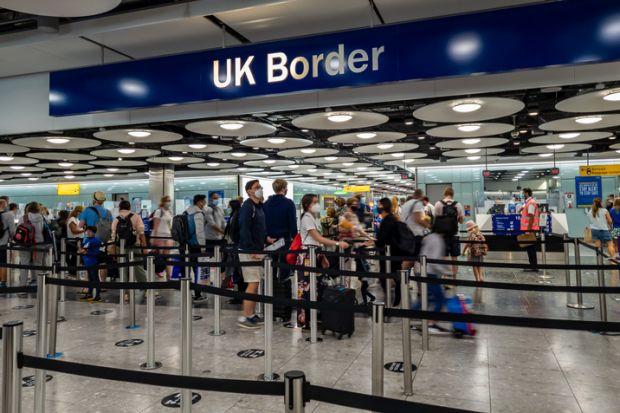The number of international students in the UK should be capped and the graduate visa should be abolished immediately, according to a new report from an influential right-wing thinktank.
Universities where “there is evidence of sustained abuse” should also be prevented from being able to sponsor student visas at all, says the Centre for Policy Studies (CPS), which adds that the London-based satellite campuses of “provincial” universities should be subjected to particular scrutiny as they are said to offer master’s courses “of dubious quality”.
In the latest attempt to move the dial within government ahead of the release of the Migration Advisory Committee’s report into “abuses” in the UK’s post study work visa – which is widely expected to lead to changes in the regime – the Tufton Street-based group has outlined its proposed reforms in Taking Back Control, a report billed as a comprehensive survey of the immigration system.
It is co-authored by Conservative MP Neil O’Brien, who has become one of the biggest critics of the UK’s post-study work options, which he has derided as a “Deliveroo visa”, claiming many recipients end up in low-paid, low-skilled work.
Scrapping the visa outright is therefore a central recommendation of the report. Instead, the authors suggest overseas students who want to stay in the UK post-study should be required to find “graduate-level jobs” that meet a certain salary threshold within a six-month grace period at the end of their studies.
The report notes that the MAC is conducting a review of the graduate route – due to be published on 14 May – but says “we should act immediately” to ensure any new rules are in place ahead of the September 2024 and January 2025 start dates for university courses.
Universities should also be held “accountable for their international students”, the report recommends, and “where there is evidence of sustained abuse”, which could include very high dropout rates, low attendance and a drop in academic standards, “they should be struck off the list of licensed study visa sponsors”.
“We should focus initially on reviewing the 18 satellite campuses of non-London universities in London, which are geared towards international students on master’s courses of dubious quality”, it says.
These universities should “reorient towards educating and training the local or regional population, rather than trying to educate the rest of the world”, the report adds.
It also recommends that the “arbitrary” target of attracting 600,000 international students a year – which was first met in 2020-21 – is “substantially revised” to “focus on quality over quantity”.
“This will…move the education and business departments away from constantly calling for more migration while resisting attempts at selectivity and control,” CPS’ report says.
The recommendations are unlikely to be popular among the UK sector, which has mounted a defence of the graduate visa in recent days, arguing it is important for the economic prosperity not just of institutions but the wider country.
“Student immigration is popular because the public believes in attracting the best and brightest students from across the globe, allowing them to study at Britain’s world-class universities, and then return home,” said Karl Williams, the thinktank’s research director and report co-author.
“Unfortunately, the reality is the routes are being abused – often the courses foreign students enrol on are low quality, dropout rates are high, and many students end up staying for the long term after their studies, often in low paid work.
“The reforms we outline will put parliament in control of the overall number of study visas issued, rather than effectively leaving it up to the universities. They will also reduce the potential for abuse – ensuring those who come to Britain on study visas are genuinely here to study, and not as a backdoor to full-time work.”




